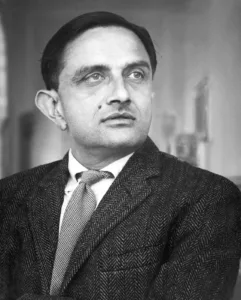
Dear Patriot,
In the realm of space exploration, one name stands out as a visionary leader whose contributions have shaped the trajectory of India’s journey into the cosmos. Meet Vikram Sarabhai, a pioneering scientist and the father of the Indian space program. In this blog post, we delve into the life, work, key contributions, and exceptional achievements of this remarkable individual.
Early Life and Education
Vikram Ambalal Sarabhai was born on August 12, 1919, in Ahmedabad, Gujarat, India. From a young age, Sarabhai displayed a keen interest in science and technology. He pursued his education at Gujarat College and later earned a Bachelor’s degree in Physics from the University of Cambridge. His academic pursuits laid the foundation for his future endeavors in the field of space science.
Founding the Indian Space Research Organization (ISRO)
Sarabhai’s vision for India’s space program began to take shape in the 1960s when he founded the Indian National Committee for Space Research (INCOSPAR), which later evolved into the Indian Space Research Organization (ISRO). His goal was to harness space technology for the socio-economic development of India and to propel the nation into the forefront of space exploration.
Key Contributions to Space Science
Under Sarabhai’s leadership, ISRO achieved numerous milestones that laid the groundwork for India’s space program. One of his most significant contributions was the establishment of the Thumba Equatorial Rocket Launching Station (TERLS) in Thiruvananthapuram, Kerala, which played a crucial role in conducting space research and launching sounding rockets.
Sarabhai also spearheaded the development of India’s first satellite, Aryabhata, which was launched into orbit in 1975. This historic achievement marked India’s entry into the space age and laid the foundation for future satellite launches and space missions.
Vision for Space Applications
Beyond scientific research, Sarabhai envisioned the use of space technology for practical applications that would benefit society at large. He championed the development of satellite communication, remote sensing, and meteorological applications, which have since become integral components of India’s space program.
Legacy and Enduring Impact
Vikram Sarabhai’s legacy extends far beyond his contributions to space science. He was a visionary leader who believed in the power of science and technology to drive progress and uplift the lives of people. His emphasis on indigenous development and self-reliance laid the foundation for India’s emergence as a space-faring nation.
Sarabhai’s pioneering efforts paved the way for future generations of scientists and engineers to build upon his work and continue India’s journey into space exploration. His legacy continues to inspire and guide the Indian space program as it reaches new heights and explores new frontiers.
Together with fellow industrialists from Ahmedabad, he significantly contributed to the establishment of the Indian Institute of Management, Ahmedabad.
The lander for India’s Chandrayaan-2 moon mission, scheduled to touch down near the South Pole of the moon on September 20, 2019, was named Vikram in his honor.
Awards and Recognition
Throughout his career, Sarabhai received numerous awards and honors in recognition of his outstanding contributions to science and technology. He was awarded the Padma Bhushan, one of India’s highest civilian honors, in 1966, and posthumously awarded the Padma Vibhushan in 1972. His legacy lives on through the institutions and initiatives he founded, including the Vikram Sarabhai Space Centre (VSSC) in Thiruvananthapuram, which continues to be a hub of space research and development in India.
In conclusion, Vikram Sarabhai’s life and work exemplify the transformative power of vision, perseverance, and dedication. His pioneering efforts laid the foundation for India’s space program and inspired generations of scientists and engineers to push the boundaries of knowledge and exploration. As we look to the stars, we are reminded of the enduring legacy of this visionary leader who dared to dream of a future among the cosmos.

Leave A Comment